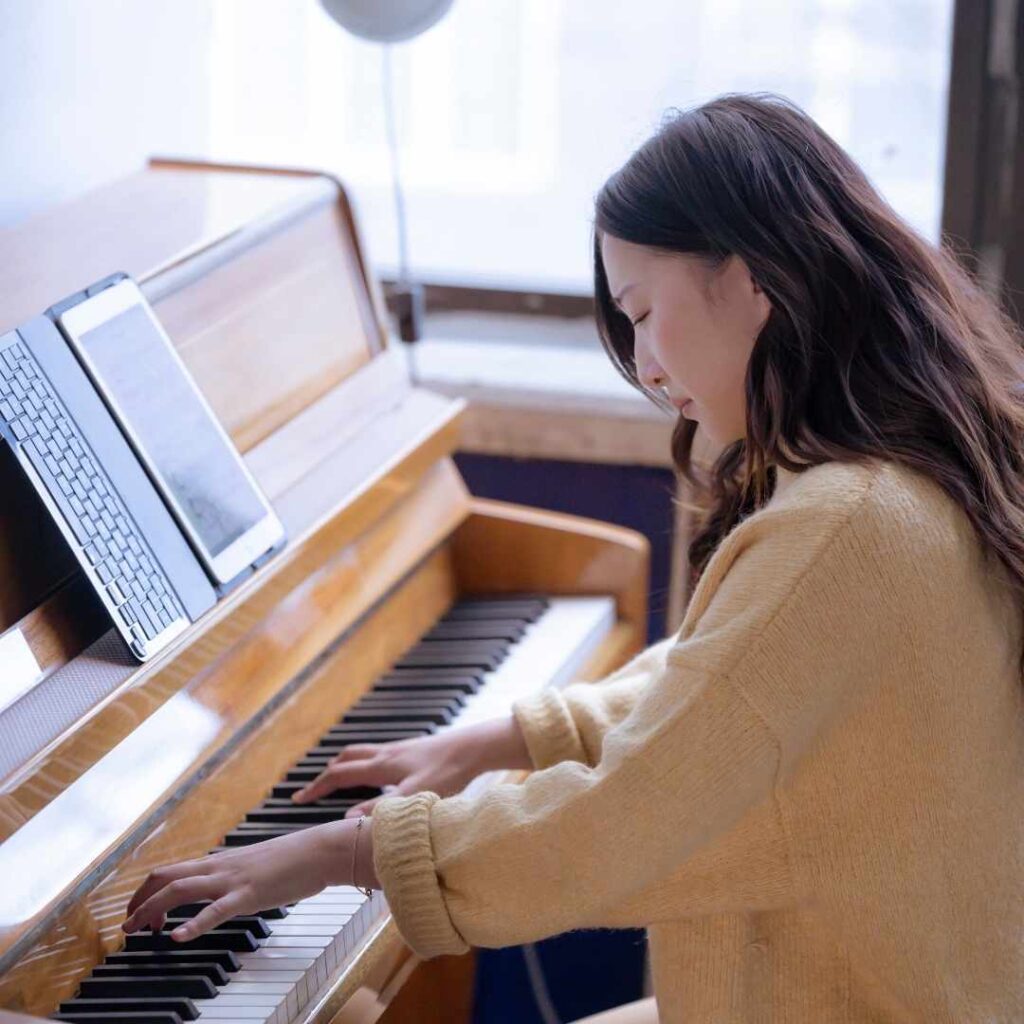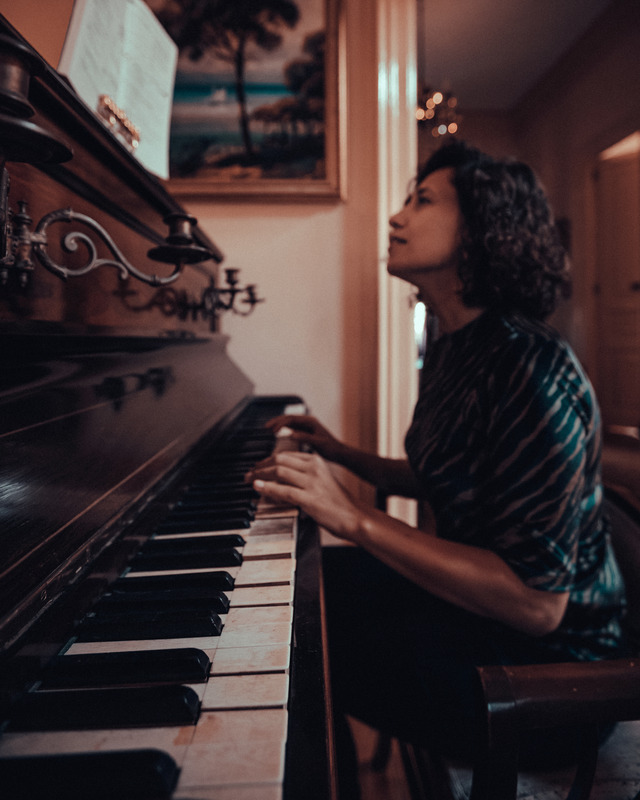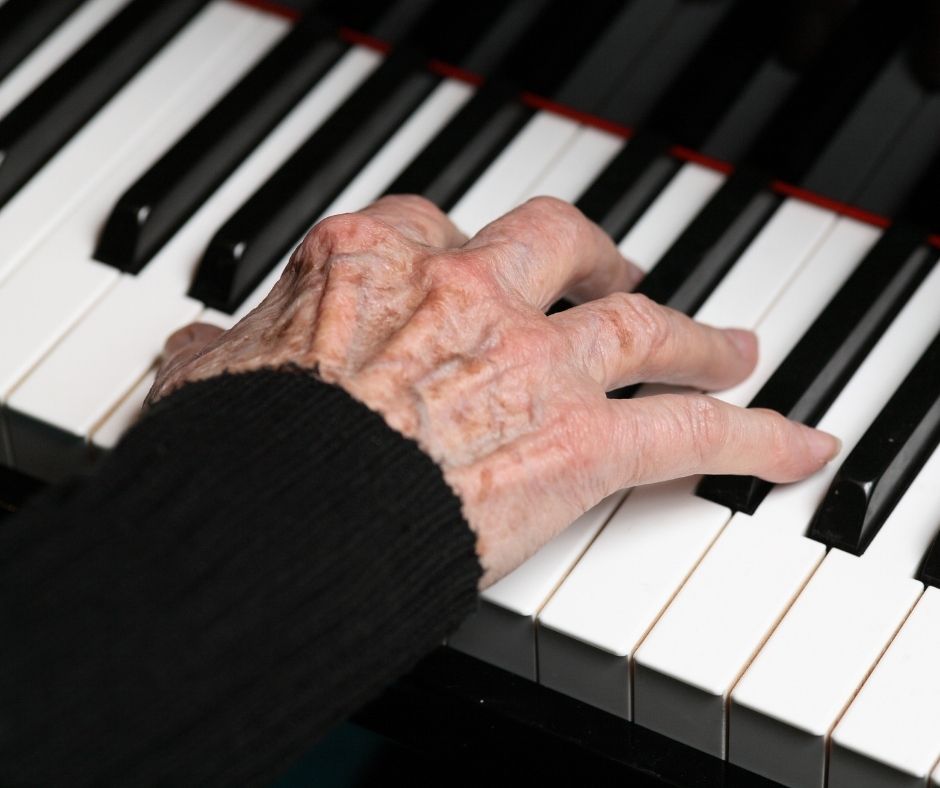Taking Piano Lessons as an Adult
Guest Contributor: Anna Hathaway

My First Piano Recital
My first piano recital was in the fourth grade. I played a piece by Bach. I unfortunately (and am rather embarrassed that) I can’t remember what the song is called, but not only can I humm the piece right now from start to finish, which is nothing to brag about (I mean, it’s Bach. Everyone knows Bach!).
My fingers still know the directionality of the notes, when to cross over each other, and an estimate of how large or small the jumps are.
I haven’t played that piece in maybe over 20 years
Yes, 20 years, but I’m betting that if I were to sit in front of a piano with the sheet music and you covered my hands, I would still be able to play the song hitting 90% of the keys correctly.
So yeah, since I just recently turned 40, that means I’ve been dabbling on the piano for over 30 years.
And yet, I am still trying to convince you why you should start taking piano lessons as an adult now, today, as soon as you can, regardless of how far along in your life-span you are.
So, regardless of how far along in your lifespan you actually are, why should you start taking piano lessons as an adult?
I’m going to give you 2 reasons (and a bonus reason) why learning the piano as an adult, right now, whether you’re 30, 60, or even 90 (Go you, by the way!) can and will change your life.
1. Taking piano lessons as an adult wakes your brain up.

Let’s be real here. Whether you believe the science or not, the older we get, the smaller our brain literally and physically gets, which also means the harder it is to learn.
Study after study shows that after you turn around 30, your brain just slows down. And study after study shows that adults who continually challenge their brain with newness, with challenges out of the normalcy of their life, have a reset and refreshed brain.
There has even been research that shows a direct correlation between somewhat regularly driving a different way to work, even if it is simply turning right one block earlier or later, and the increased efficiency, flexibility, and creativity of the brain. It has to wake up. It has to work.
I mean, how many of us have left the house and gotten to work and wondered, “Wait, how did I even get here?!” That is a brain that is less a brain or more an auto-pilot, and I don’t know about you but I don’t want to auto-pilot my way through a drive, let alone my life.
Our brains are like our bodies.
What happens to our bodies if we don’t use them, don’t move them, don’t work them?
If they sit hunched over desks and computers all day (and thanks to Covid, who isn’t?), sit hunched over a delicious meal all day (and thanks to Covid, who isn’t?), stand hunched over the sink all day? (This isn’t a question about weight at all, but physical use of the body.)
They get softer and less capable, stiffer, and not surprisingly more susceptible to long-term injuries as we get older. Our brains are no different.
So what to do? What is recommended?
Now I’m going to be straight up with you. I’m not a scientist, and I can’t talk about the synapses or the connective tissue or the dopamine journey, but if you’re someone who likes to get all nerdy about science, then this lovely and relatively easy-to-understand article from The Power of Positivity should do the trick as it is rife with terms I would struggle to spell (and I’m an English teacher!).
I can and will only speak generally based on my own experience and research. Regularly the science shows to learn something new.
And, regularly, one of the most recommended hobbies is learning a musical instrument or a foreign language. So yeah, taking piano lessons as an adult will not only give you a new skill, but with time, patience, and practice, it will give you a new brain, a more alive brain.
A brain that is active and awake and ready to be used.
And we all know that a brain that is more active and awake is a brain that is more adaptive, more likely to solve difficult problems. And most importantly, a brain that is active and awake is usually a brain that is more creative.
So not only will you be more likely to solve difficult problems, but since you’re learning something new, challenging your brain in a new way, it will start thinking in an unknown pattern and will thus start solving problems with quite potentially much more thoughtful and smart solutions.
Who wouldn’t want a better solution over a good solution?
2. You learn discipline.

Do you have the skill of riding a bike? Probably, as most of us gain this skill as a child, with mom or dad holding onto us both lovingly and fearfully, screaming that WE CAN DO IT! And then, low and behold, we do it.
It usually only takes about a week, maybe two tops depending on how often you practice, to be able to say with confidence, “I know how to ride a bike.”
Now, learning how to ride a bike may be difficult for sure. However, it doesn’t require any true time, patience, commitment, discipline. Ok, fine, maybe in the short term, sure. And for an 8 year old practicing something for two weeks and then experiencing success is what builds the confidence to take on a harder skill that might take 3 weeks, or oven 2 months to learn; little successes build on bigger successes.
And let’s say you do learn to ride when you’re 8, and you ride often enough to become a confident bike rider, but then life happens and ten years have gone by without you so much as touching that old best friend of yours.
You wonder, “Huh, I wonder what this is going to be like…?” And you hop on to find out, maybe even pop on your helmet (and elbow pads if you were me) just for safety, and go for a ride. Maybe at first you wobble, use your brakes going uphill for, you know, safety, or even fall off (thanks for that helmet!).
After about 5 minutes everything has changed and you are absolutely flying, sailing around the neighborhood feeling as close to a bird as you can without jumping out of a plane with a 250-pound shaggy-haired man strapped to your back and breathing awkwardly in your ear.
Learning to play the piano is not learning to ride the bike.
My point: Once you know how to ride a bike, you know how to ride a bike. Learning to play the piano is not learning to ride the bike. It is not a 1 week, 1 month, or even 1 year-and-done skill.
To really learn this instrument is honestly a never ending process, because there is always a new song, a harder or faster or more complex song full of cross overs and forearms and sometimes even feet to learn, and even then let’s say you learn every single song there is to learn to play.
Now there are new ways of playing the piano (7 young and might I say brilliantly creative people, a shaker, and a piano are turning a beloved pop song into an expression of innovation you can’t help but wonder in awe at) that you didn’t even know was possible, and then, after all is learned and played, you now have piano songs to write.
The only single way to learn the piano is to practice discipline, to practice commitment, to practice patience. And the coolest thing about this is that the more proficient you become at the piano, the more able and comfortable you are at committing yourself to harder things, and the more patience you gain to deal with hardships.
So basically learning the piano isn’t just learning an instrument. It’s learning a completely new way of living.
…learning the piano isn’t just learning an instrument. It’s learning a completely new way of living.
So just do it!
This whole thing started with me explaining why you should start taking piano lessons as an adult, and I gave you two very solid reasons. Both of those reasons are very adult reasons.
So how about my favorite reason of all?
Just Take Music Lessons as an Adult Because It’s Fun!
It’s fun to get lost in a song, in what feels like a moment but ends up stretching itself to an hour, maybe more, where you forget everything except what’s real: you, this beautiful instrument, your metaphorical sweat and love and curiosity. It’s even fun to get so full of rage at still not getting that impossible fingering (darn you, XXXXXX!!), yelling and screaming and banging all the keys at once…. until you DO get that…possible fingering.
So whether you decide to challenge your brain and take piano lessons as an adult because you want to wake up your brain, learn discipline, or have fun, I don’t really care. All I care about is that you do it.